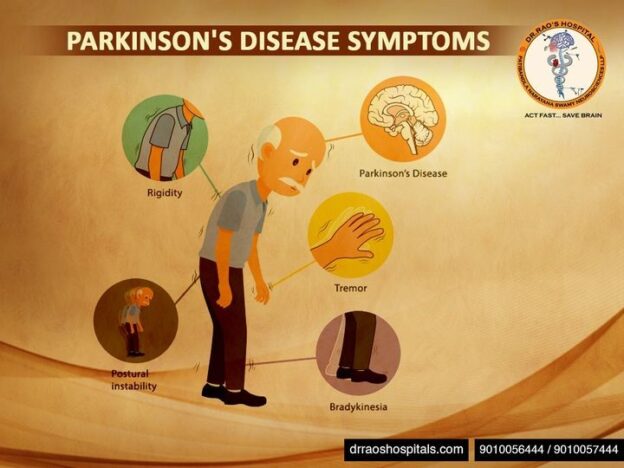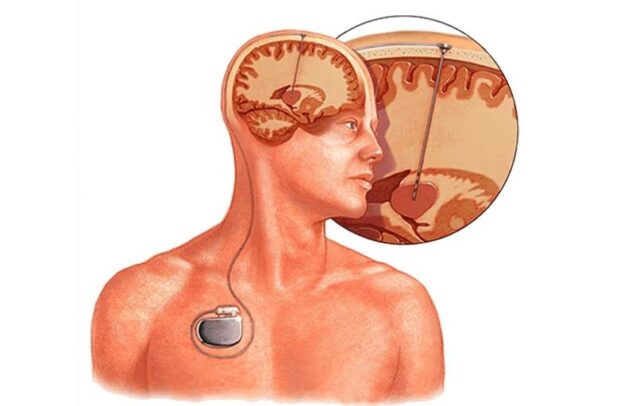Do you have shaky hands?
Is there any stiffness in your body?
Are you having difficulty walking?
If yes, then it is likely that you are suffering from Parkinson’s disease.
Parkinsons Treatment is a neurological condition that affects movement. It happens when the nerve cells in the brain that create the chemical dopamine, which is crucial for motor function, have a problem. As a person’s dopamine levels fall, his or her motor function begins to deteriorate. Tremors in the hands, rigidity or stiffness in the body, and trouble walking are all early indicators of Parkinson’s disease. Parkinson’s disease causes the muscles of the individual suffering from the condition to weaken over time. But there is no lock in this world made without a key!
In the same way, there is no problem in this world without a solution! Yes, there are treatment options available in Guntur for Parkinson’s disease. The best treatment is at Dr. Rao’s hospital.
One can treat Parkinson’s disease by visiting the best neurology hospital in Guntur, Dr. Rao’s Hospital. Our hospital has top neurosurgeons, such as Dr. Mohana Rao Patibandla. He is a fellowship-trained functional stereotactic surgeon from the USA. He has solutions for all neurological disorders, including Parkinson’s disease. According to mid-day
What are the Parkinsons treatment options available at Dr. Rao’s Hospital in Guntur for treating and managing Parkinson’s disease?
We suggest a specific treatment for treating Parkinson’s disease based on the following factors:
- Age
- Medical history
- Type and severity of the condition
- Patient’s tolerance for specific procedures and medications
- Patient’s preference
Treatment for Parkinson’s disease usually includes the following:
- Medications
- Surgery
- Complementary therapies
Let’s take a closer look at each of these treatment alternatives.
• Medications
Medications can help with the significant symptoms of Parkinson’s disease, such as tremors and movement issues.
Your neurosurgeon in Guntur may prescribe the following medications:
Levodopa plus carbidopa:
Most people with Parkinson’s disease need to take levodopa at some point.
Your brain’s nerve cells absorb levodopa and transform it into the chemical dopamine necessary to transmit signals between brain regions and nerves that control movement. Improvement with Levodopa is one distinguishing feature from other dangerous Parkinson’s plus syndromes.
Movement issues are usually improved by increasing dopamine levels with levodopa.
Agonists of dopamine
Dopamine agonists, like ropinirole and pramipexole, function in the brain as a substitute for dopamine and have a comparable but lesser impact than levodopa. Compared to levodopa, they can be given less frequently.
They’re usually taken as tablets, but they can also be applied to the skin as patches.
Amantadine is an antiviral drug that treats dyskinesias brought on by dopamine agonists.
Inhibitors of monoamine oxidase-B
Selegiline and rasagiline are monoamine oxidase-B (MAO-B) inhibitors that can be used instead of levodopa to treat early Parkinson’s disease.
They increase dopamine levels by blocking the effects of monoamine oxidase-B, an enzyme or brain chemical that breaks down dopamine.
• Surgery
The experienced neurosurgeon at Dr. Rao’s Hospital in Guntur may consider one of the following surgeries for Parkinson’s disease, depending on the patient’s needs, medical history, health, and symptoms:
Surgery for a lesion (burning of tissue):
Deep areas of the brain are targeted in this treatment, and small lesions are produced in important parts of the brain that control movement, like the Globus pallidus or subthalamic nucleus, based on your predominant symptoms. To help pinpoint the exact location of the lesion, the procedure may be performed while the patient is conscious. The lesion is placed to help control or stop the tremor-causing area of the brain.
Deep Brain Stimulation (DBS):
In this sort of surgery, a tiny electrode is implanted in the crucial areas of the brain that help control movement. Wires inserted beneath the skin connect the electrode to a tiny battery in the chest wall. The stimulator is then activated, interrupting the usual flow of information in the brain and helping reduce Parkinson’s disease symptoms.
Continuous intestinal infusion of levodopa/carbidopa in advanced Parkinsons Treatment:
Using a portable pump to give a gel suspension of levodopa or carbidopa directly into the duodenum lets the drug work where the body absorbs it. Bypassing gastric emptying and duodenal infusions of LCIG helps to avoid a possible reason why levodopa does not work as well as it should. This leads to less variability in plasma levels of levodopa and fewer motor fluctuations compared to oral levodopa.
Tissue transplants or neural grafts:
Experimental research aims to develop a replacement for the brain area that fails in Parkinson’s disease.
Complementary Therapies:
Physiotherapy
A physiotherapist can help you relieve muscular stiffness and joint pain through movement and exercise.
Occupational therapy
An occupational therapist can help you discover problems in your daily life, such as dressing or getting to the store.
They can help you devise practical solutions and ensure that your home is secure and correctly configured for you. This will help you preserve your independence for as long as possible.
Therapy for speech and language
Dysphagia (difficulty swallowing) and speech issues are common in patients with Parkinson’s disease.
A speech and language therapist can often help address these challenges by teaching speaking and swallowing exercises or offering assistive technology.
Dietary suggestions
Making dietary modifications can help some patients with Parkinson’s disease improve their symptoms.
These modifications may include:
• To avoid constipation, increase the fiber in your diet and ensure you drink enough water.
• Increasing your salt intake and eating small, frequent meals will help you avoid low blood pressure issues, such as dizziness when standing up rapidly.
• Adopting dietary modifications to prevent unexpected weight loss
The above treatment options will surely help manage Parkinson’s disease.
So, what are you waiting for? It is now time to treat and manage Parkinson’s disease by visiting the best neurology hospital in Guntur, Dr. Rao’s Hospital with the best neurologist and neurosurgeon, Dr. Mohana Rao Patibandla.
SYNOPSIS
Parkinson’s disease is a degenerative disorder of the central nervous system that often impairs a person’s motor skills, speech, and other functions. The disease results from the death of brain nerve cells that produce dopamine, which aids in controlling movement.
There are two main types of Parkinson’s disease: early-onset and late-onset. Early-onset Parkinson’s disease usually affects people under the age of 50, while late-onset Parkinson’s disease typically affects people over the age of 60.
There is no cure for Parkinson’s disease, but there are treatments that can help improve a person’s quality of life.
Early-onset Parkinson’s Disease
Early-onset Parkinson’s disease is the less common type of the disease, accounting for about 10 percent of all cases. The average age of onset is around 47 years old. Men are more likely to develop early-onset Parkinson’s disease than women.
The symptoms of early-onset Parkinson’s disease are similar to those of late-onset Parkinson’s disease, but they tend to be more severe. People with early-onset Parkinson’s disease may have difficulty walking and talking, and they may also experience tremors, rigidity, and problems with balance.
There is no cure for early-onset Parkinson’s disease, but there are treatments that can help improve a person’s quality of life. Medications can help relieve symptoms, and surgery may be an option for some people.
Late-onset Parkinson’s Disease
Late-onset Parkinson’s disease is the more common type of the disease, accounting for about 90 percent of all cases. The average age of onset is around 60 years old. Men and women are equally likely to develop late-onset Parkinson’s disease.
The symptoms of late-onset Parkinson’s disease are similar to those of early-onset Parkinson’s disease, but they tend to be less severe. People with late-onset Parkinson’s disease may have difficulty walking and talking, and they may also experience tremors, rigidity, and problems with balance.
There is no cure for late-onset Parkinson’s disease, but there are treatments that can help improve a person’s quality of life. Medications can help relieve symptoms, and surgery may be an option for some people.
Conclusion:
Parkinson’s disease is a degenerative disorder of the central nervous system that often impairs a person’s motor skills, speech, and other functions. The disease results from the death of brain nerve cells that produce dopamine, which aids in controlling movement. There is no cure for Parkinson’s disease, but there are treatments that can help improve a person’s quality of life.
Dr. Rao’s Contact Information:
- Phone: 9010056444, 9010057444
- Email: info@drraoshospitals.com
- Address: Old Bank St, GV Thota, beside AK Biryani Point, Guntur, Andhra Pradesh 522001
- Website: Dr. Rao’s Hospital


